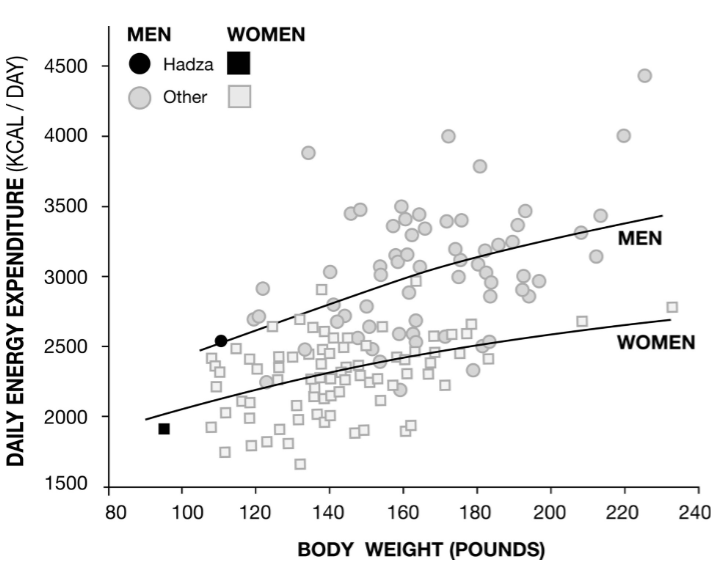
This is a fascinating typesetting by evolutionary biologist Herman Pontzer on how our vital metabolic needs and worriedness add up to our total daily energy expenditure.
It unprotected my eye considering something well-nigh calories in/calories out has never seemed to add up for me. The conventional wisdom is that to determine your daily caloric needs, first go to a bmr calculator. This tells you your undermost metabolic rate, or the number of calories your soul will slosh if you lay in bed all day. Then estimate your worriedness level, and a multiplier calculates your energy consumption for a typical day. The worriedness level tables are a little too vague for me. So alternatively, what I’ve unchangingly washed-up is tell the calculator I’m sedentary to get my sedentary calories, then explicitly add in estimates of calories I burned exercising (say, in a two-hour velocipede ride). Now if I’m trying to lose weight, I just eat fewer calories than my estimate of what I’m burning. This works, but it never seems to be quite right, I unchangingly lose weight increasingly slowly than the estimate. For example, if I estimate I’m urgent 2600 calories a day, and only eat 2100, I should lose a pound a week (a deficit of 3500 calories should requite one pound of weight loss).
But this never seems to work out, weight loss is unchangingly slower, a miracle many researchers have confirmed. But if you put people in a metabolic ward, where calories in and calories out are directly measured, and they are in a caloric deficit, they lose weight exactly as expected. So it’s not the concept of calories in vs. calories out that is incorrect. Dr. Pontzer shows convincingly that the problem is the calories-out estimate. The estimate is based on the theorizing that undermost metabolic rate and calories from activities just add up linearly. They do not: your soul has many sophisticated bounty mechanisms, and when it senses you are undereating or have widow increasingly activity, it can make adjustments so other sources of energy expenditure are turned down. Dr. Pontzer calls this result “constrained daily energy expenditure”.

How this is proven is a fascinating story in itself. It turns out there is a very well-judged method I had not heard of using “double-labeled water” for measuring total daily energy expenditure. You can determine “calories out” for any species by getting a human or other unprepossessing to drink the high-tech water then doing lab work on their urine. The marrow line is that in the long run, total energy expenditure is related to the size of the individual, regardless of worriedness level.

The Hadza are one of the last populations on earth still living a traditional hunter-gatherer lifestyle with little influence from the outside world. They are an impressive people, relatively small in stature but tough as nails and very intelligent. Their worriedness level is much higher than that of typical modern humans, but as the graph shows, their daily energy expenditure is pretty much the same as modern humans with the same soul size. Another study Dr. Pontzer mentioned tracked sedentary people who trained to run a half-marathon a day, with their energy expenditure tracked through the process. As expected, their energy expenditure initially went up considering of all the spare activity. But over time their persons adjusted, and their energy expenditure went when lanugo to not much increasingly than it had been when they were sedentary.
This is a similar effect for people trying to lose weight as predictions of set-point theory, which predicts that your soul will retread to undereating by slowing your metabolism. But the new finding for me was that the same thing happens for physical activity.
Lest this should discourage people from exercising, there are a couple of important points to note. First, as Dr. Pontzer heavily emphasizes, exercise has many health and metabolic benefits vastitude weight loss. I’ve made this point previously in a couple of wares urging people to put health first, not weight loss. Second, you can override your set point over time by losing weight gradually and sticking to unprocessed foods.

These important findings well-nigh metabolism are not the only reason to read this book. The science explained by Dr. Pontzer is amazing, as are his first-hand descriptions of field research, such as participating in archaeological digs, living with the Hadza and observing their daily activities (including hunting and gathering), and collecting urine specimens from Orangutans.
.



